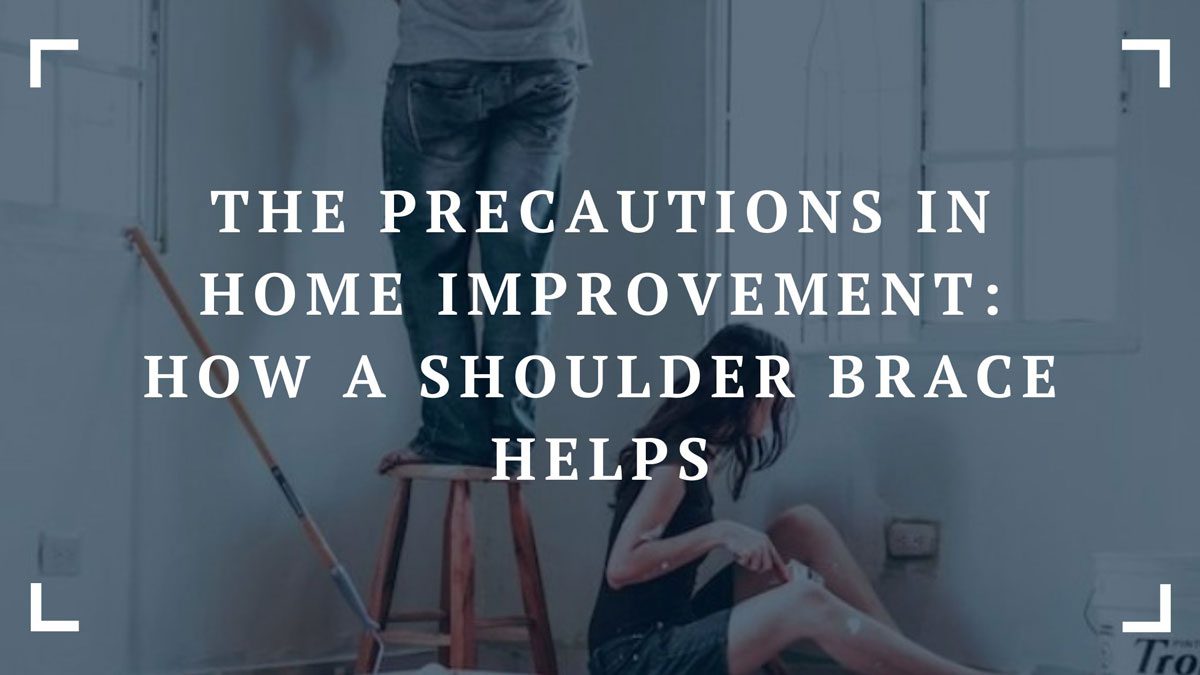Whether you are embarking on a major renovation or simply sprucing up your dwelling, home improvement goes beyond paint colors and décor choices. Such tasks, while rewarding in the end, pose physical risks that often go unaddressed. Unplanned mishaps can occur, leading to injuries if proper precautions are not taken. Among the precautions necessary in home improvement ventures, the small but mighty shoulder brace stands as an incredibly important tool. This post will delve into the fundamental aspects of home improvement, the many precautions necessary, and how something as seemingly simple as shoulder support can aid in making your home improvement journey safer and more comfortable.

Home Improvement Risks
When setting out to enhance one’s residence, it’s crucial to be aware of the potential hazards linked to such tasks. Investigating these risks further, data reveals an upsetting surge in injuries associated with these activities. The accidents span from minor cuts and bruises to severe impairment, emphasizing the vital importance of adhering to safety measures throughout the process.
Among these incidents, injuries related to the shoulder, frequently caused by hefty lifting or repetitive motion, are significantly common. In-depth exploration reveals an array of conditions such as muscle strains, tendonitis, or even more severe ones like a rotator cuff tear. Consequences of such mishaps range widely in severity, but they all affect the quality of life negatively, hampering everyday activities. Bearing these potential dangers in mind while engaging in home improvement activities aids in ensuring safer and healthier execution.
Working Mechanism of a Shoulder Brace
A shoulder support, in simple terms, is a supportive device worn around the upper torso and arm region. Designed to fit snugly without impeding mobility, it’s typically crafted from robust, yet flexible materials. Boasting adjustable straps, it offers a customized fit to accommodate varying body types and sizes.
The significant premise behind this practical tool revolves around injury prevention and pain alleviation. By providing compression and support, the brace aids in stabilizing the shoulder joint, maintaining correct alignment, and reducing the risk of overexertion. Consequently, this lessens the likelihood of straining muscles and tendons, making tasks more comfortable and secure. For a practical example, you can check out this link: https://threo.nz/product/shoulder-support-for-pain, which provides comprehensive information about a high-quality brace.
Identifying Home Improvement Tasks Where Shoulder Support Is Essential
In the realm of home maintenance, numerous tasks may require added support which a brace offers, aiding in both safety and comfort.
- Consider painting projects. Hours of up and down strokes can wear on shoulder muscles, where a brace could assist;
- With DIY tasks like hanging drywall or setting up ceiling tiles, continuous overhead work can stress your shoulders. Here, a brace offers much-needed stability;
- Landscaping work, such as trimming hedges and trees or moving hefty pots and planters, often demands strenuous lifts and pulls. In such scenarios, the brace becomes an invaluable tool to avoid overexertion;
- Tasks like moving furniture or any other heavy object in your renovation process are situations where a shoulder brace proves beneficial.

Unique Advantages of the Shoulder Immobilizer in Home Improvement
In the context of home improvement, the humble shoulder stability brace transforms from a mere accessory into an agent of safety and comfort.
Accelerating Healing after an Injury
Unfortunate incidents can occasionally occur during home improvement tasks, leading to injuries. In such instances, a brace seamlessly steps in to expedite the recovery process. It provides necessary, balanced support to the injured area, fostering an environment that accelerates healing.
Enhancing Blood Flow and Pain Relief
A shoulder stabilizer serves largely by enhancing circulation around the problematic or injured area. Increased blood flow brings in more nutrients and removes waste, helping to alleviate pain associated with various concerns like frozen shoulder, dislocated shoulder, rheumatic pain, or muscle and ligament tears.
Reducing Discomfort and Strain
A significant benefit offered by the brace, particularly appealing to those involved in strenuous home improvement tasks, is its role in reducing discomfort and strain. By providing consistent support and stability, it ensures the shoulder joint isn’t overworked, preventing strain and reducing the chances of damage.
Aiding in Muscle Relaxation
It aids in muscle relaxation during these tasks. By providing compression and heat, it assists in easing muscle tension and helping them to relax. The immediate effect is not just greater comfort but also a reduced risk of muscle fatigue, enabling you to keep going for longer with less risk.
Usage and Maintenance Guidelines
With the proper use and care of a shoulder immobilizer, you can extend its lifespan while securing its optimal function. Ensure an excellent fit appropriate to your body type for enhanced functionality; a brace that’s too loose or too tight can be counterproductive. Maintain hygiene by washing the brace as per manufacturer guidelines; this not only prolongs its life but also prevents skin complications.
To reap all the benefits, remember to wear your brace for the recommended period and not to rely on it excessively. A brace is there to assist, not take over the function of your muscles. Regular stretches and suitable strengthening exercises of the shoulder will also create a conducive environment for the brace to work at its best in providing support. By following these tips, you can optimize the brace’s benefits while enhancing your home improvement experience.
Understanding shoulder sling optimum usage, recognizing the tasks it is best suited for, and incorporating it into your routine is vital in reaping the benefits it offers. With an emphasis on safety at the heart of every DIY endeavor, it can prove to be a steadfast ally, making home improvement not just more secure, but also more enjoyable.

